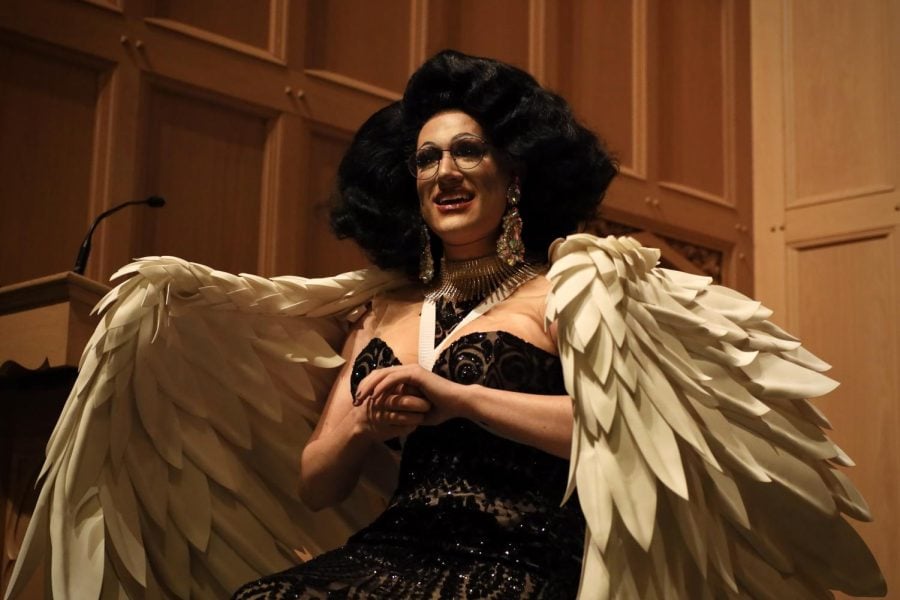Ms. Penny Cost discusses being the first drag queen certified candidate for ordination in the United Methodist Church
Joanne Haner/The Daily Northwestern
Ms. Penny Cost discusses the intersection of drag and spirituality at the Jeanne Vail Chapel.
February 25, 2022
Wearing a black sequin dress and angel wings, Ms. Penny Cost strutted down the aisle of the Jeanne Vail Chapel to discuss her experiences as the first drag queen to become a certified candidate for ordination in the United Methodist Church.
The event was sponsored by the Rainbow Alliance, Sacred Worth and the University Christian Ministry.
“(Ms. Penny Cost) empowers those on the margins while simultaneously inspiring those who hold privilege in our shared society,” the Rainbow Alliance’s Instagram post said.
Cost is 24 years old and an associate pastor at the United Methodist Church. She opened by discussing the tension between queerness and faith, posing the question of how she could feel a divine connection with a queer art form that the church has historically deemed unholy.
Quoting rapper Missy Elliott, Cost explained that to better understand and change the world, marginalized people must “flip it on its head.”
“The art of drag is one route on which individuals in the queer community can begin to engage with the current lest and grotesque of life,” Cost said. “It is not a solution to oppression … but it is a starting point in which we may each begin to claim our power, our love, our life and ourselves.”
Cost also discussed how drag serves as a “revolutionary and inclusive art form.” Outside of drag, they identify as queer and transgender. Cost noted while drag is dominated by cisgender men in the mainstream media, anyone can partake.
Although drag does not equate to identifying as a transgender individual, Cost said those identities are also not mutually exclusive.
“The beauty of drag is that it lives and breathes drag and means something different to every single person you ask,” Cost said. “No single identity or sexuality or background holds a trademark.”
After clarifying no two definitions of drag will ever be the same, Cost gave her own perspective on how she views the art. She described drag as an act that celebrates identity — regardless of what others’ or societal expectations.
“It was born of the convergence of fear and hope and the dreams of tomorrow, while unabashedly living today,” Cost said.
While applying her makeup, Cost said she meditates on those who came before her. For Cost, drag allows her to access every part of herself, especially those she was told to hate or hide.
Not only does drag allow Cost to celebrate the “divine surety” within herself, but also to show others how to celebrate themselves.
“There is a holy liberation occurring when folks feel that they can release the mysterious secrets of their lives shrouded by society,” Cost said. “My stilettos rest upon the shoulders of every queer person — closeted, out and outed — who has sought ministry within the church.”
However, Cost said she was not always able to express herself.
Raised in a small town in Illinois, Cost recalled how her father refused to be served by a waiter who did not conform to his standards of masculinity.
“Though I was only eight or nine at the time, the lesson of rigidity and identity, compliance to normality was heard loud and clear,” Cost said. “I had to do anything and everything I could to fit within the mold that I hadn’t inherited by birth. I would learn how to hide myself from the world.”
While striving to be like her father, Cost envisioned herself as a police officer. Instead, she said she could not be prouder that she ended up as a drag queen minister.
Cost concluded by talking about how the intersection of drag and spirituality can help address the history of oppression and trauma.
“Drag can be a starting point to change,” Cost said. “It can provide the representation, hope, joy and inspiration and can do so in a way that has never been seen before in the entire history of the church.”
After her speech, attendees asked Cost questions. She stayed after for attendees to take pictures with her.
For Weinberg sophomore Erin Mannschreck, it was inspiring to see a drag queen in the place of a traditional priest.
“Even a religion that is so set in stone in so many ways and has rules, you can still make it make sense to you,” Mannschreck said.
Email: carolinebrew2024@u.northwestern.edu
Twitter: @CarolineLBrew
Related Stories:
— Northwestern’s Body Acceptance Week promotes authentic lives over social media
— The 40 Days of Spiritual Wellbeing creates a space for renewal



